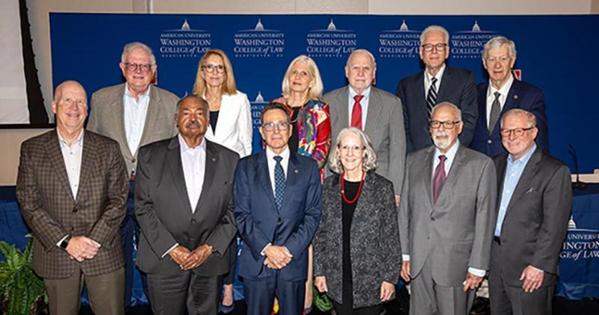AUWCL Hosts Global Conference Celebrating 100 Years of the Federal Arbitration Act

Marking a century since the passage of the Federal Arbitration Act (FAA), the American University Washington College of Law (AUWCL) convened a major international conference on June 5, 2025, drawing nearly 200 attendees and 31 distinguished speakers from across the United States and abroad.
The event, co-hosted by AUWCL’s Center on International Commercial Arbitration and the College of Commercial Arbitrators (CCA), examined the FAA’s enduring impact on commercial arbitration and explored what lies ahead for the field, including the influence of emerging technologies such as generative artificial intelligence, and the Supreme Court’s impact on the FAA’s interpretation.
“This anniversary is not just a moment to look back, but to look ahead,” said Dana Welch, president of the CCA, in her opening remarks. “It provides a timely opportunity for the College to revise and update our Protocols for Expeditious, Cost-Effective Commercial Arbitration, which were first adopted in 2009. We are also considering a new protocol focused specifically on the use of AI in arbitration practice.”
Attendees included some of the most prominent U.S. arbitrators, plus a wide range of international arbitrators and CCA fellows from countries such as Canada, Mexico, Peru, Japan, and several European nations—underscoring the global relevance of the FAA and its influence on cross-border commercial dispute resolution.
Throughout the day, panelists praised the FAA for its durability and adaptability. Still, several speakers noted areas in the statute that may be outdated, a theme echoed in a recent Special Issue of the American University Business Law Review dedicated to the FAA’s centennial. While legislative reform is unlikely in the near term, many agreed that the evolving jurisprudence surrounding arbitration in U.S. courts will continue to shape the field’s trajectory.
“The FAA has not only endured for 100 years, it has evolved,” said one panelist. “But as the pace of change accelerates, particularly with technology and global commerce, we need to continue refining the tools and frameworks that support effective arbitration.”
In his closing remarks, Professor Horacio A. Grigera Naón, director of the Center on International Commercial Arbitration, reaffirmed AUWCL’s role as a hub for thought leadership in this area.
“This conference reflects our ongoing commitment to advancing the study of arbitration law and policy,” he said. “As we look to the next hundred years, our Center will continue to serve as a forum for scholarly debate and practical innovation in the field.”
This event was coorganized by WCL’s Center on International Commercial Arbitration and the College of Commercial Arbitrators, and had the generous support of JAMS, the American Arbitration Association, the law firm of Shook Hardy & Bacon, CPR Dispute Resolution, the law firms of Concepción, GreenbergTraurig, John Burrit McArthur, and Eiseman ADR LLC. Media partner was Transnationnal Dispute Management (TDM).